- Home
- Phyllis Ann Karr
Frostflower and Thorn Page 3
Frostflower and Thorn Read online
Page 3
The warrior pulled her sword out of its sheath and began to polish the sheen-amber in its handle. “It’d be easier if I’d come with you while the grub was still inside me. But then you wouldn’t have needed so much protection—ironic, eh? Why don’t you just grow the damn brat big enough to gnaw carrots and walk on its own two feet?”
“We are unwise to manipulate time except when necessary. Already Starwind will learn slowly, because his brain did not keep pace with his body’s growth. He could not meditate fully on all that happened to him within the womb.”
“Meditate! A grub like that meditate?”
“All creatures meditate, Thorn. Many of us believe that the very corn and beans we grow meditate. That is one reason we grow only enough for our needs. Even a carrot is better for maturing in its own unprodded time.”
That was not the only reason. Manipulating time for any creature, living or inanimate, required full concentration to channel the power. Quickly as sorceri could grow an individual plant, they could not have supplied any considerable part of the Tanglelands with food. There were not, had never been and surely never could be enough sorceri to feed the whole population, while the attempt to supply even a single village would have brought down on them a full attack from the farmer-priests. But to say more than necessary would break Frostflower’s vow of prudence. She must know the swordswoman longer before she could judge how fully to take her into confidence.
“Your carrots taste as good as farmers’ carrots to me,” said Thorn. “And I’ll eat stones if a lump of a two-day-old grub meditates. What about those dreamberries you’re going to grow me for getting you through safe? I suppose there’ll be something wrong with them, too.”
“I have several of my own growing, if you wish to sample one.”
“Hellbog, I wouldn’t know the difference. Never touch the things myself—worse than wine for scrambling your brain. But I’ll find plenty of folk ready to pay good coins for them, no questions. Wake me when you’re ready to move on.” The warrior closed her eyes and was soon breathing evenly. Dowl got up and padded over to stare up wistfully at her sunburned face, wagging his tail but keeping at a careful distance from her foot.
The infant at last let go Frostflower’s nipple and began to wrinkle up his small face. At his first wail Thorn woke, snorted, muttered “Damn brat,” and shut her eyes again.
Frostflower sighed and reached down for the skin of goat’s milk and the small tin spoon. If she had actually borne Starwind herself—indeed, if she had ever borne any child—it might have been possible to speed time for her bosom, to bring milk faster. But in that case, she herself could no longer have manipulated time. She would have lost her sorcerous power along with her virginity. Milk could not be hurried in her breasts; if it came, it must come in its own time, through the infant’s sucking. Yet it might come. Silverflake had nursed children. So had Wren, and so had the old sorcerer Moonscar.
There was another reason Frostflower would not have speeded Starwind’s growth. Any person whose time was speeded lost the equivalent number of days or years from the end of the natural lifespan, unless put into the trance of cool breathing to adjust the balance. Frostflower had not yet told the swordswoman this—she would also have had to explain that the good sleep Thorn had enjoyed that first night in the weavers’ house had been the trance. She guessed, however, that if she told Thorn how four years’ growth now might cost Starwind four years from the end of his life, the warrior would respond, “What difference do the first three or four years make to a stupid grub?”
When Starwind had fed, the sorceress changed his breechcloth and buried the soiled one. It was safer to carry only clean rags and conceal the wet and smelly ones.
Then she awakened Thorn and they returned to Straight Road North. On the other side of Weldervrise Forest, on the edge of the marshy land just south and west of Maldron’s Farm, they came to a gibbet—two upright ladders, each twice as high as a tall man, with a third ladder nailed crosswise atop them. From the top ladder hung a warrior, the thick rope that was passed around her back pressing deeply into her armpits and shoulders, her head slumped forward, her hands tied together in front of her with the fingers strapped together. A few outlaws some years ago had managed to untie themselves during the night, so that farmer-priests and townmasters now took precautions. The warrior’s feet were only handsbreadths from the ground. The unstained rags bound tightly around her midriff and abdomen suggested that her scaffolding had been the commonest one, that of being forced to swallow small, sharp pebbles. Had she been disemboweled for the quickest death, the rags would have been bloodstained; had she been hung without scaffolding for the slowest death, there would have been no rags.
“Hellbog of a place for a gibbet,” Thorn remarked. “Marsh bugs stinging the poor bitch to a pulp before she dies.”
The hanging wretch groaned, twitched, raised her head for a moment to cry out a few half-coherent words before slumping forward again. Frostflower stopped. She could not leave the woman like this.
“Take him, Thorn. For only a few moments. Please?” She held Starwind out to the swordswoman. Thorn shrugged and took the infant, not happily, but with reasonable care.
One hand on Dowl’s head, to steady herself against the sight, Frostflower walked the score of paces to the gibbet.
The hanging woman lifted her head again, very slightly, and stared at the sorceress with glazing eyes. Then she screamed and tried to clutch at her waist with her bound hands.
“Stones?” whispered Frostflower.
“Sixty—seventy—help me!”
There was no hope for life, then. “You would die quickly?”
“Gods!—stab—something!”
Unable to bear the sight of the distorted, insect-bitten face, Frostflower closed her eyes and twisted her fingers into Dowl’s shaggy coat. “You would die quickly?” she repeated. How could the woman not wish it? Yet the sorceress must have a clear answer.
“Yes!—Damn you—gods, yes!”
The sorceress sighed, breathed deeply, and stretched out one trembling hand to touch the hanging warrior. Then she concentrated, finding the heartbeat of the woman before her, gripping it in her mind and making it race faster and faster until the separate throbs melted together into a steady hum…
The hanging warrior shrieked, jerked, uttered a quick, hiccoughing rattle. Then Frostflower sensed by the quieting of the air drafts that she now hung still. Beside the sorceress, the dog whined a little and then started to howl. Frostflower opened her eyes, glanced up once more at the motionless warrior who stared unseeing downwards, then turned and walked back to the road. She was suddenly aware of Starwind’s wail.
“Well,” said Thorn, handing back the infant, “why did Maldron hang her?”
“What?”
“What was her crime? Farmers don’t usually gibbet poor bitches just for practice.”
“I don’t know.” Shaken from the effort, Frostflower hugged Starwind close and started to walk down the road once more.
“You didn’t ask her? What were you talking about?”
“I asked her if she wished to die quickly.”
“Warriors’ God! Couldn’t you figure that out for yourself?”
“Despite all, even in pain, a person may desire life as long as possible,” replied Frostflower after a few steps. “I could not act without her assurance, and she was not…completely coherent.”
“I’d like to know how damn coherent you’d be! Look here, sorceress, if you ever find me dangling from a gibbet with my belly full of stones or my guts hanging out, don’t fart around asking me if I want to die! Just kill me and get it over with.”
It took little imagination—too little imagination—to see the swordswoman’s tall body dangling, tawny golden head slumped forward, green eyes beginning to glaze… Frostflower’s mind recoiled from the image. “You will not let me find you like that, Thorn?”
“Well, I couldn’t run away if I saw you coming.” Thorn grinned, as if
they were not speaking of torment and execution. She has more perfect detachment-in-unity than I, thought Frostflower—more acceptance of the limitations of her own awareness and the little difference her comfort or pain makes to the rest of her fellow creatures.
“But it would have been handy,” the warrior went on, “to know what that poor bitch back there did. Once in a while you find a farmer with some strange laws for his territory. You sorceri should know that even better than us warriors.”
“Still, I think they do not often form a law without reason.” At least, the sorceress thought, not without such excuses as they considered reason—but the rule of the farmer-priests was still preferable to the rule of some others who had held power in the Tanglelands and elsewhere in ancient days, as sorceri learned from the old writings.
Thorn pulled out her dagger, tossed it up spinning in the air, and caught it deftly by the blade as it descended. “A sorceress praising the farmers! What is an innocent like you doing out in the open?”
“Allowing you to bring me back safely to my retreat.”
“Unh. Well, I suppose you have to get out of those stinking places sometimes for a little fresh air, hey?”
Frostflower did not answer. Despite her effort to talk lightly, the gibbeted warrior still echoed in her mind. After walking a few moments in silence, Starwind’s weight a comfort in her arms and Dowl brushing against her robe from time to time, she said, “I did not kill her, Thorn. I quickened time for her body. She died as she would have died, but much sooner.”
The swordswoman tossed her dagger up again, caught it, and shrugged. “Whatever you did—if I could do it, I wouldn’t need Slicer and Stabber. Why do you want me along with you?”
“We must not use time for a weapon.”
“Hunh.” Thorn sounded unconvinced. She would have heard many tales, some of them based on truth. “Well, if you have to be a damn virgin and eat vegetables, I wouldn’t qualify anyway.”
The warrior put her dagger back in its sheath and began to whistle as she strode along. Dowl pricked up his ears and sidled a little closer to Thorn, hopefully but cautiously. She had been pushing him aside since their first meeting.
In normal circumstances, sorceri usually preferred to journey alone. The same rumors and tales which caused them to be hated, despised, and cursed in muttered tones throughout the Tanglelands also caused them to be feared and generally left to themselves. The protection of a warrior, when one could be found willing to hire herself to sorceri, had its own inherent dangers. During the first ten days of her journey, Frostflower had relied on the evil reputation of her kind. Mutterings and rudeness had sometimes grown loud, perhaps because she was smaller than most sorceri who ventured abroad, and because she cultivated the inoffensive rather than the menacing appearance; but she had found that a sudden stare from her mismatched eyes would silence the jeers when they became too threatening. In Windslope Retreat, her eyes, the left brown and the right blue, were a matter for affectionate pleasantry; but here among the worshippers of the farmers’ many gods, folk seemed to find these eyes things of superstitious horror. Even Thorn had faltered on first seeing them.
Starwind had changed Frostflower’s circumstances. Throughout the Tanglelands, it was a mortal crime to steal a child. A sorceress with an infant was an immediate object of suspicion, and the suspected offense was so abhorrent that folks’ indignation might outweigh their fear. Nor would she dare try to explain the child’s presence, as she might have it she had merely bought him. By farmers’ law, such sorcery as she had used for Thorn was unlawful for all of them—sorceress, woman helped, and even, they said, for the child.
The very presence of a warrior at her side, however, would do much to allay suspicion and discourage attack. Already, by walking openly in daylight, they had passed a party of merchants and two drivers of fruit-wagons on Straight Road without arousing more than a few glances of surly surprise and distaste.
Thorn waved her hand toward a high stone wall ahead to the right. “Maldron’s Farm, probably. Too bad we can’t take cover there.”
Sorceri could generally find lodging for a night in towns, but they never went into farms.
“We could dress you up like a craftswoman, maybe,” Thorn went on.
“That would be a lie, Thorn.”
“Um. Besides, you’ve been this way, coming south. They’d know you by your blasted eyes. Well, let’s hope we get to Gammer’s Oak before those clouds build into something.” Thorn cocked her head toward the northwest. “I was thinking of hiring out to Maldron, too. They say he’s a decent farmer to work for, usually planning a raid on somebody.”
“Elvannon does not send his warriors on raids, but he pays generously.” Frostflower was glad to mention the nearest farmer-priest to Windslope, a comparatively mild lord, gentle in his use of superstition.
“Sounds like the kind that expects a warrior to help herd the bloody cows when she’s not fighting. Well, your dreamberries should bring me enough money to take my time and scout around a little on my way back.”
Maldron’s Farm was large, but its length lay east and west, so that the travelers soon passed the part of his wall bordering Straight Road. The marshland was still to their left, as treacherous if not quite as malodorous as the Hellbog of the farmer-priests’ mythology; but now Beldrise Forest, a wood of oak and ash, had replaced the wall to their right.
According to records and speculations preserved in Windslope Retreat, a farmer-priest of many generations ago, perhaps when warriors were still the fighting members of the farmers’ concubinaries, had filled in the land east of Straight Road, using the sturdy, ancient pavement as a retaining wall. The work had been extensive, reaching north until the land began to rise naturally at the Rockroots. When first completed, probably it had all been farmed. But in the following generations, as the original farmer’s descendants lost power and drew in their fortifications, the northern part of the filled area had reverted to the wild. No doubt the oldest of these trees had first been planted to retain the soil, but the forest had long been reseeding itself. Moonscar, the oldest and chief sorceron of Windslope, could remember how, before he had come to the Retreat as a newly-converted lad of thirteen, Beldrise Forest had been so dense with undergrowth that a person could not walk in it without a sickle to cut the way.
Maldron’s grandmother Arrana, a widowed farmer-priestess of almost legendary determination, had instigated the family’s return to power in the higher politics of the farmer-priests. Her son had begun the work of clearing the undergrowth north of the Farm, so that today Beldrise was a pleasant wood to walk in. Maldron, it seemed, preferred to increase his lands by raiding his neighbors on the east and south, rather than work at filling in unclaimed marshland west of the road as his distant ancestor had filled in marshland to the north.
Starwind was crying again for food, Gammer’s Oak was still almost an hour’s walk, and the forest offered secluded places.
“Well, all right,” said Thorn, glancing again at the sky on their left, above the marshland. “But don’t mess around poking your tits at the grub. Just feed it with the spoon right away. You can play with it to your heart’s content when we’re snug and dry with that baker friend of yours in Gammer’s Oak.”
The sorceress studied the western sky. She had no wish to expose the infant to a storm; but she did not consider the threat as imminent as Thorn seemed to suppose. As yet they felt no hint of cool winds, and the slowly massing clouds, though dark, were still far in the distance. Sorceri had reason, perhaps more reason than warriors, to study weather; and Frostflower judged they would have time to feed the infant—provided she did not linger too long—and still reach Burningloaf’s home before the rain.
They found a fallen ash not far from the forest’s edge, but far enough to be hidden from the road. Whenever they stopped to care for the infant’s needs, Thorn was either lazy or restive. This time she was restive. She buried Starwind’s wet rags herself, grumbling that they had to think about s
aving time. Then, after watching Frostflower ease two spoonfuls of milk into the child’s mouth, the warrior said, “I’m going to look for toadstools. I’ll probably find a silver’s worth before you’re ready to burp the brat.”
Frostflower nodded. Thorn would not wander far; she was too impatient to resume their journey. The sorceress thought she would be back before Starwind had swallowed his last spoonful.
She was not. The infant pushed the last spoonful away with tongue and lips, gurgling in satiation; and Frostflower held him at her shoulder and patted his back until the belches came. Still the swordswoman had not returned. Beldrise Forest seemed suddenly very quiet. The birds were twittering, the small animals rustling and scurrying, Dowl thumping his tail against the fallen tree; but there were no human footsteps, no whistling or stamping.
The sorceress waited, cooing the baby to sleep. Sometimes, when he was well asleep before she rose, she could walk with him a considerable distance before he woke.
Now a west wind was beginning to stir through the trees, and Frostflower herself was growing more concerned about reaching Gammer’s Oak before the storm. She had noticed, out of the corner of her eye, which direction Thorn had taken. As soon as the infant slept, Frostflower rose and followed the swordswoman. She went slowly, watching for the newly-scuffled moss, the fresh-tramped humus and crushed grasses that marked Thorn’s path deeper into the woods. She expected at every step to meet the warrior coming back to scold her for not waiting near the road.
Somewhere ahead and slightly to the left, she began to hear a low chanting. It was quiet, one deep voice joined at intervals by a second, higher voice. There was nothing openly sinister in it, yet it caused her to shiver. It was not sorcerous chanting—it was in a minor rather than a major scale; the rhythm was not even, but varying between short and long holds; and it seemed, as she neared it, to be in a strange language. Could this be the chanting of farmer-priests? She had never heard it, never witnessed any of the rituals they used to spread their myths of many gods. Yet did not the farmers conduct their rites in large halls, for large groups of people, rather than deep in the forest?

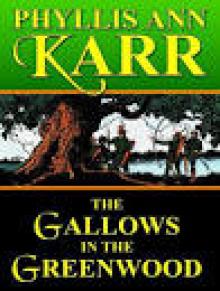 The Gallows in the Greenwood
The Gallows in the Greenwood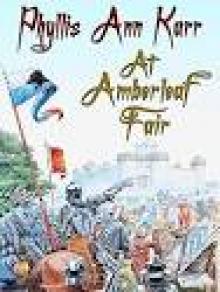 At Amberleaf Fair
At Amberleaf Fair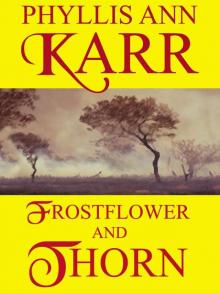 Frostflower and Thorn
Frostflower and Thorn The Fanciers & Realizers MEGAPACK
The Fanciers & Realizers MEGAPACK All But a Pleasure
All But a Pleasure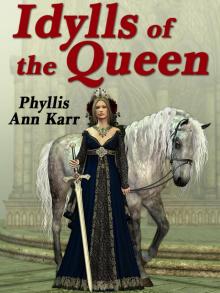 The Idylls of the Queen
The Idylls of the Queen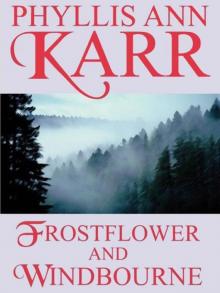 Frostflower and Windbourne (Frostflower & Thorn)
Frostflower and Windbourne (Frostflower & Thorn)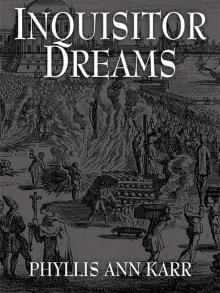 Inquisitor Dreams
Inquisitor Dreams